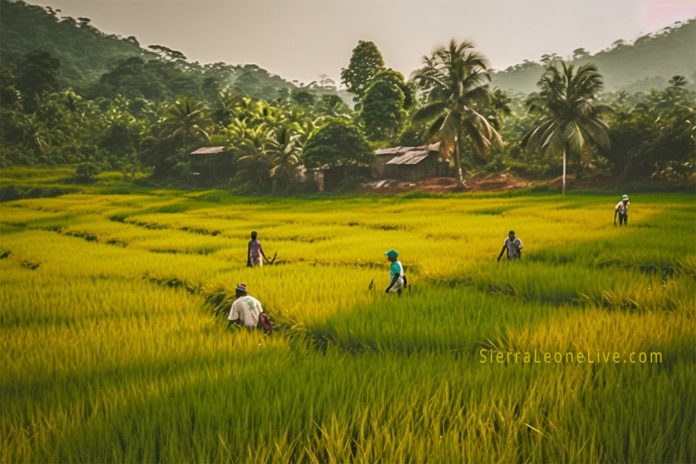

SLPP 2018 Manifesto: A Promise to Transform the Agricultural Sector in Sierra Leone
By the Sierra Leone Live Team
The agricultural sector, which makes up most of the country’s employment and accounts for about half of its GDP, is the foundation of Sierra Leone’s economy. The SLPP laid out its strategy to transform it in its 2018 manifesto. Sierra Leone Live will look into whether the SLPP has kept its promises and accomplished the objectives outlined in its manifesto as the June 24, 2023 elections draw near.
With its vast lands, varied agro-ecologies, high agro-biodiversity, plentiful rainfall, and many rivers, Sierra Leone has an ideal agricultural climate that may support the production of food for both domestic use and export. Small-scale subsistence farming and other biophysical and socioeconomic limitations that restrict food production and self-sufficiency are the sector’s prominent features.
According to the World Food Programme (WFP) and Food and Agriculture Organization (FAO), 49.8% of households in Sierra Leone did not have enough food to sustain a healthy and active lifestyle. With 38.5 percent of the population underweight, the nation is third in the world for hunger.
A strong food security strategy, easy access to financing, poor land management, insufficient value addition, poor roads, a lack of market information, limited human capacity, and low investment in agriculture were among the major issues the SLPP manifesto cited as facing the agricultural industry. The National Sustainable Agricultural Development Plan (NSADP) of the APC administration could not adequately address these problems.
The SLPP sought to transform the agricultural industry as part of the New Direction set forth in the manifesto by producing food in a sustainable and diverse manner, creating gainful jobs, and preserving the natural resource base. Increasing agricultural investment, raising food and cash crop production, enhancing livestock production, and improving irrigation, water management, land management, governance, and research were among the top priorities.
The SLPP had plans to boost domestic finance initiatives, work with mining companies, encourage local banks to lend to the private sector for agricultural objectives, review land tenure rules, and raise budgetary allocation to agriculture to 10% in accordance with the Maputo Accord.
The manifesto provided several recommendations for enhancing food and cash crop production, including the establishment of a seed bank system, the adoption of commercial farming that is mechanized, the diversification of crop production, a review of the input and output market systems, and the rehabilitation of feeder roads.
The SLPP recommended revitalizing research stations, reopening veterinary clinics, assisting hatcheries, encouraging maize production for feed, and constructing pilot areas for intensive cattle production in order to increase livestock production.
The manifesto also included recommendations for better governance, agriculture sector research, and management of water and land. The creation of fertile Inland Valley Swamps (IVS) and waterways, the expansion of agro-climatological activities and water resources, the creation of a national soil conservation program, and the strengthening of agricultural stakeholders’ capacities were among the key projects.
It will be critical to evaluate whether the SLPP has been successful in putting these policies into practice and whether they have improved the agricultural sector as Sierra Leone Live looks into the party’s performance. Has Sierra Leone’s food security, self-sufficiency, and the number of malnourished people decreased because of the SLPP’s efforts? Has the government improved infrastructure, like roads and veterinary facilities, boosted investment in the field, and extended research? Have new laws and rules been passed to safeguard landowners and promote international investment in agriculture?
Sierra Leone Live will examine the SLPP’s achievements in the agriculture sector in further detail during the following weeks. Our aim is to offer an unbiased assessment of the party’s performance so that Sierra Leoneans can vote on June 24, 2023, having made an informed decision.
Stay tuned for our upcoming analysis.



